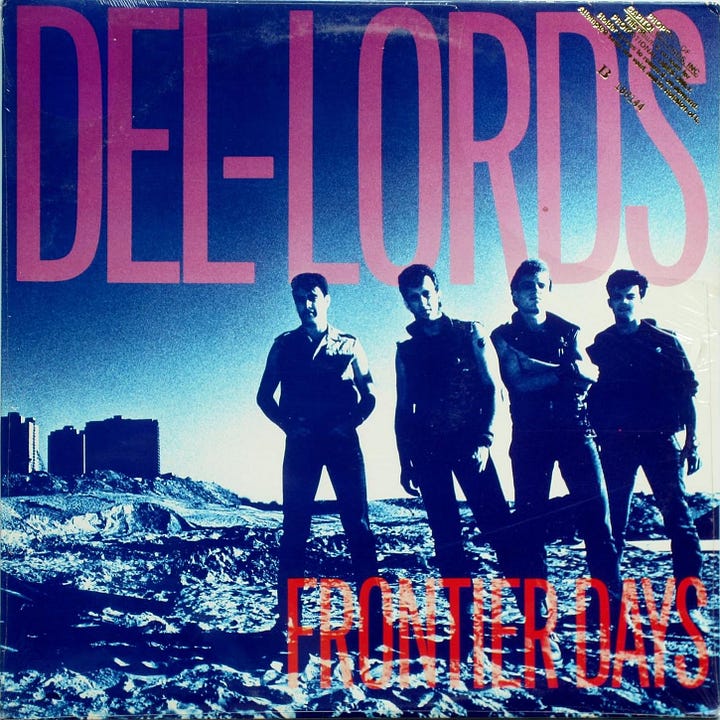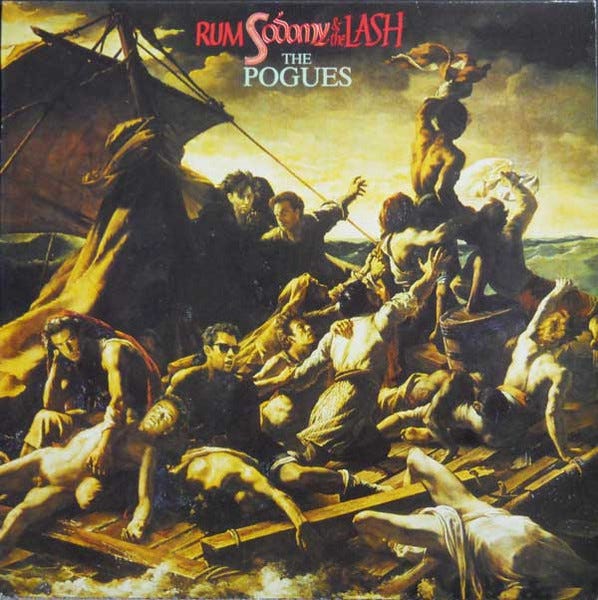

If the internet is to be believed, these two albums came out nearly a year and a half apart from each other — the Del-Lords’ Frontier Days on March 20, 1984, and the Pogues’ Rum, Sodomy & The Lash on August 5, 1985. But I always associate them as being from the same period of my life, a period of insatiable hunger for new music that was both fed and further stimulated by my equally insatiable reading of whatever music-related periodicals I could get my hands on. And now that the sad passings of the former’s Scott “Top Ten” Kempner and the latter’s Shane MacGowan have both happened this week, they will be henceforth further fused together in my mind.
I came relatively late to Frontier Days, not finding out about it until the autumn of 1984, when I read a review of the album in (I think) the pages of CREEM magazine, a rock rag I read religiously in those days. My knowledge of music history still far outstripped my actual listening experience at this point; I hadn’t heard the Dictators or the Flamin’ Groovies yet, but I’d heard of them and knew they were considered “important” — so when both of those names were referenced in the album’s review, I made a mental note to keep an eye out for Frontier Days in the bins. Just a few days later, Rolling Stone Records (which may or may not have changed its name to Rock Records by then) in downtown Chicago came through for me, as it did so often in those years.
To say that Frontier Days was the right album at the right time for me would be a severe understatement. I was living and working in Chicago, but my sights were intently set on returning to my ancestral homeland of New York City (or at least somewhere near it) for college, and the album’s rootsy rock was steeped to its pompadour in both the unyielding grittiness of the NYC streets and the unrepentant sense of romance that the city always invoked for me. Even the album’s cover art — featuring the band members hangin’ tough on “the beach” north of what would become Battery Park City — seemed to capture the essence of what felt like an exciting transitional period in the city, back when the Big Apple was starting to bounce back from its “drop dead” tribulations of the 1970s, yet was still a vibrant and relatively affordable playground for artists of every stripe.
Best of all, for a budding guitarist like myself, was the fact that the album’s songs were all pretty easy to learn and play along with. Scott Kempner, who wrote the bulk of the album’s songs (though everybody in the band got at least one turn at the mic), clearly loved classic rock n’ roll chords, and he and lead guitarist Eric Ambel played ‘em cleanly enough that I could make out exactly what they were doing. Up until that point, Bruce Springsteen’s Darkness on the Edge of Town, the Ramones’ Rocket to Russia and the Byrds’ Greatest Hits were the only albums I owned that I could semi-convincingly strum along to all the way through; Frontier Days, which in retrospect was kind of a blend of those three records, became my fourth.
Many years later, I was pleasantly surprised to find Scott Kempner working behind the counter at Amoeba Records in LA. He mostly wanted to talk baseball — I was wearing some throwback jersey or another at the time — but I managed to work my love of Frontier Days into the conversation, and tell him how important the album had been to my development as a guitarist. “Up there with Springsteen, Ramones and the Byrds?” he replied, grinning like I’d totally made his day, but with one eyebrow raised as if he wasn’t entirely sure that I wasn’t yanking his chain. “Hey, that’s pretty good company.”
I’d bought the Elvis Costello-produced Rum, Sodomy & The Lash almost as soon as it arrived on these shores as an import, having been hipped to the band’s brilliance in the pages of UK music papers Melody Maker and New Musical Express. While I also learned to play and sing a few tracks from that album — their arrangements of the traditional “I’m A Man You Don’t Meet Every Day,” Ewan MacColl’s “Dirty Old Town” and Eric Bogle’s “And the Band Played Waltzing Matilda” — I never attempted to figure out any other Pogues songs on guitar. For me, their music was really all about the joyous and riotous clash of folk roots and punk rebellion, topped by Shane MacGowan’s drunken-poet slur; it was a combination that felt impossible, nay foolhardy, to even try and replicate.
Frontier Days and Rum, Sodomy & The Lash sounded nothing like each other, but their spirit was remarkably similar. Both albums fused the energy and no-bullshit attitude of punk with respect and admiration for earlier, more traditional sounds. Their songs were fueled by the righteous rage of outcasts who were doing whatever they could to survive in their respective cities — whether driving a cab on the streets of Manhattan, or giving old men “a swift one off the wrist” in a London alley — but also radiated a profound sense of “in the gutter but looking at the stars” romance. Both bands would make good-to-great records in years to come (and Red Roses for Me, The Pogues’ thrashy 1984 debut, is worth grabbing as well), but none would hit me quite as squarely, or as wonderfully, as these two.
I saw both bands several times in the 1980s, and both of them always delivered, albeit in very different ways. The Del-Lords had an almost military precision to their playing, while The Pogues were always something of a gloriously fiery shambles; the tightest Pogues show I ever saw was the November 1987 one at NYC’s Ritz with Joe Strummer deputizing for the ill Philip Chevron on rhythm guitar — the former Clash frontman’s ceaselessly stomping left foot seemed to keep everyone on point for once.
I witnessed that Ritz show in the company of my friend Don, whom I’d first met at the start of our freshman year of college. We lived across the hall of our dorm from each other, and bonded pretty quickly over our shared love of punk rock and a likewise shared intolerance for goofy college kid bullshit — so of course we also bonded over Rum, Sodomy & The Lash. Being of proud Irish descent, Don was able to explain some of Shane’s more obscure (to me) lyrical references, which was of course an added bonus.
Flash forward a decade to August 1995. I was living in Los Angeles, and Don — who was paying a visit out there to see his brother — just happened to be in town at the same time that Shane MacGowan and The Popes were playing the House of Blues in West Hollywood. We went to the show together, and immediately knew we were in for a treat when we saw former Pogues accordionist James Fearnley in line ahead of us at the Will Call window; and indeed, “Maestro Jimmy” (who would go on to write a rather scabrous memoir of his time with the Pogues) played quite a few Pogues classics with Shane and the band that night, including “The Broad Majestic Shannon,” which had Don and I swinging our pint glasses in the air, our eyes glistening and arms draped emotionally over each other’s shoulders.
But my favorite moment of that night occurred at the very beginning of the show. As Shane ambled out onstage with a shrug and a gummy “Right, let’s get soused” grin, a tiny, shirtless, elfin lad suddenly materialized directly in front of us. “It’s Shane MacGowan!” he exulted in a lilting Irish accent to no one in particular. “He’s the King of Eye-reesh Poonk!” And then the lad vanished into the pit, which went straight to full boil as soon as the band kicked into “Streams of Whiskey”.
I never got to interview Shane MacGowan, which was absolutely fine by me — notoriously suspicious of the press, he was a legendarily combative interview subject, and there was no guarantee that I would have been able to understand what he was actually saying, anyway. And I never got to officially interview Scott Kempner, which is real a shame since he was quite the gifted story teller and had no shortage of tales to tell. (Of course, an interview might have happened if he hadn’t blocked me on Facebook for penning a less than complimentary piece about Derek Jeter for Rolling Stone; that seemed a trifle overreactive to me, even coming from a diehard Yankees fan, but what are ya gonna do? It didn’t keep me from loving his music, in any case.)
Scott Kempner was a true rock n’ roll survivor. Whether with the Del-Lords, the Dictators, Little Kings (the band he formed with the legendary Dion) or as a solo act, he doggedly stuck to his guns and fought for his piece of musical turf in the face of industry indifference, personal struggles, and a country where creativity is increasingly low on the societal totem pole. He continued to do so until an early-onset Alzheimer’s diagnosis four years ago began the slow count to his ultimate exit.
Shane MacGowan was likewise fully committed to his art, but the muses that drove him to write such incredibly rich and poetic lyrics seemed to go hand in hand with demons that continually tried to drag him from this mortal coil. I (and many others) will forever marvel at fact that both he and his liver managed to make it past 1992, though that doesn’t make his demise any less sad. The two men lived profoundly different lives, yet crossed the finish line at virtually the same time… and not so long after Sinéad O’Connor, who cut this gorgeous silk-and-sandpaper duet with Shane back in 1995…
What does it all mean? I have no fucking idea. But I sure am thankful that I was here when they were. Rest in Peace, gentlemen; I raise a glass to you both.


Damn...I wish I hadn't been too consumed with soaking up the pre-holiday NYC vibes last week to read this piece when it dropped. For as it happens, the very next day in Brooklyn I would be standing and chatting with Eric Ambel, who happens to be a pal of my dear old friend, Pete, whose one-night-only art exhibition we were both attending. Lovely guy, Eric is. To top it off, the day after that, I stumbled upon a copy of Frontier Days at Village Revival Records on Bleeker! Needless to say, I enjoyed this piece as I always do, buddy. 👍🏼
Excellent piece. I was waiting for your Shane piece and it was as great as I had expected.